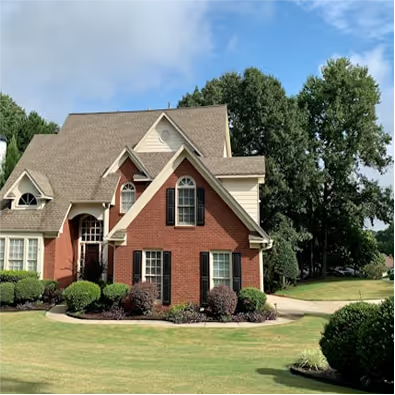Understanding Alternative Pathways to Homeownership
For many prospective homebuyers, especially those with limited or unconventional documentation, traditional financing routes can seem inaccessible. However, a variety of programs, alternative loans, and resources are designed to bridge this gap, making homeownership achievable for a broader range of individuals. This article explores these options, providing a comprehensive guide to alternative financing, assistance programs, and the protective measures in place to support buyers with unique circumstances.
Special Programs and Assistance for Buyers with Disabilities or Unique Needs
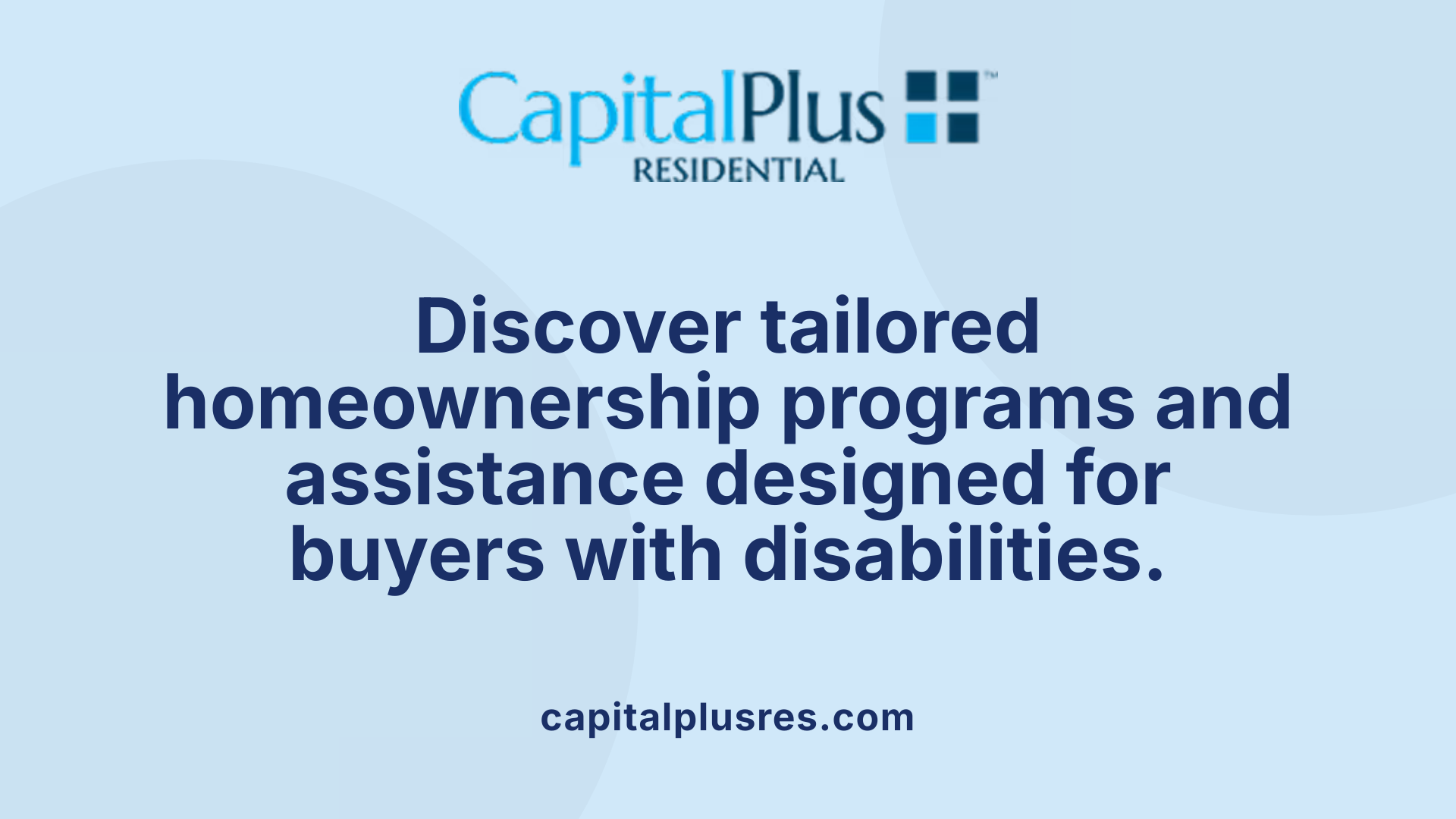
Are there special programs or options available for buyers with disabilities or individuals with unique circumstances requiring special assistance?
Yes, a variety of programs exist to support buyers with disabilities or special needs in achieving homeownership. These programs aim to provide more accessible financing options, assistance with costs, and modifications to improve living conditions.
Mortgage options with disability income
Individuals with disabilities can qualify for mortgages using disability income such as Social Security Disability Insurance (SSDI) or Supplemental Security Income (SSI). To qualify, applicants must show that these benefits will continue for at least three years, typically verified through SSA award letters and bank statements.
Special loan programs for individuals with disabilities
Several specialized loan programs are available to support borrowers with disabilities. These include FHA, VA, USDA, and Fannie Mae's HomeReady loans. These programs often accept disability income as qualifying income and have flexible credit and income requirements. Additionally, the VA offers specific grants to help veterans with disabilities purchase, build, or modify homes.
Grants and modifications for accessibility
Government agencies and nonprofits offer grants to help individuals with disabilities cover down payments and closing costs—these do not need to be repaid. Moreover, modifications—such as ramps, widened doorways, or bathroom grab bars—can be financed through VA grants like the Special Housing Adaptation (SHA) grant or HUD programs like Section 811, which support accessible and affordable housing.
Legal protections and resources
Legal protections—such as the Fair Housing Act, the Americans with Disabilities Act (ADA), the Equal Credit Opportunity Act (ECOA), and Section 504 of the Rehabilitation Act—are in place to prevent discrimination and promote accessibility. Support organizations, ABLE accounts, and government-led initiatives further assist individuals with disabilities in managing expenses and accessing suitable housing.
This broad spectrum of programs and protections ensures that buyers with disabilities or unique circumstances have opportunities and resources to secure safe, affordable, and accessible homes.
| Program Type | Description | Special Features |
|---|---|---|
| Disability Income Verification | Loan qualification using SSDI or SSI benefits | Requires proof of continuing benefits for 3+ years |
| Specialized Loan Programs | FHA, VA, USDA, Fannie Mae HomeReady | Flexible income and credit requirements |
| Grants for Accessibility | Financial aid for home modifications | Non-repayable, varies by program |
| Housing Grants | Down payment and closing cost assistance | Includes VA grants and HUD programs |
| Legal Protections | Fair Housing Act, ADA, ECOA, Section 504 | Designed to prevent discrimination and promote accessibility |
These resources bolster opportunities for individuals with disabilities, ensuring equitable access and support through tailored financial programs and legal protections.
Risks, Benefits, and Policy Considerations of Non-Traditional Home Buying Methods
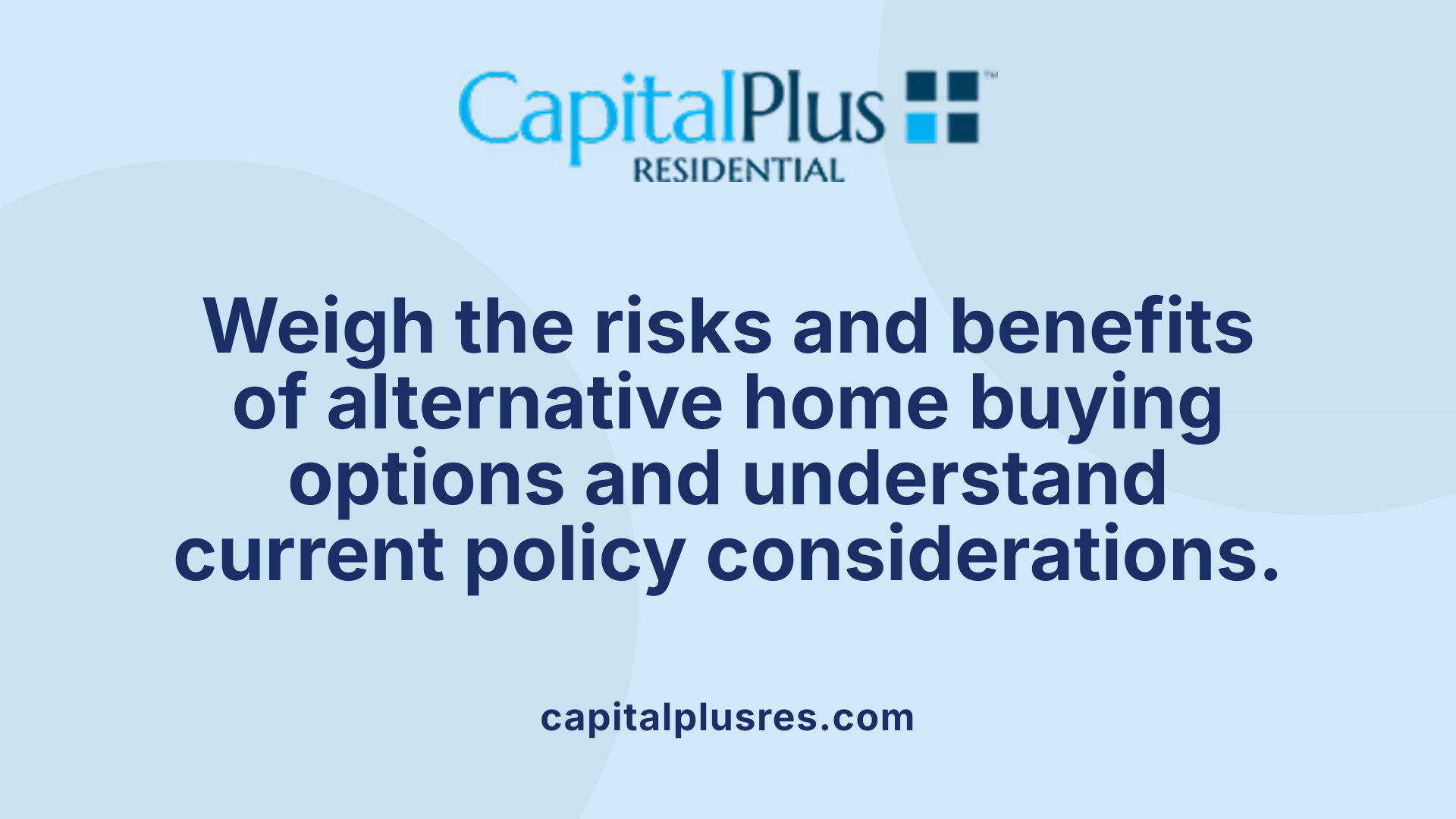
What are the risks, benefits, and policy considerations associated with non-traditional home purchasing methods?
Non-traditional home buying options—such as cash offers, co-signers, lease-to-own arrangements, owner financing, shared equity deals, and real estate auctions—have become alternative pathways for many prospective homeowners. These methods can help individuals with limited credit or savings access the housing market more quickly and with fewer initial barriers.
One significant advantage is the potential for faster transaction processes, often without the lengthy approval steps involved in traditional mortgage lending. Additionally, some of these options may offer lower upfront costs or more flexible terms, which can be appealing, especially in competitive markets or for buyers with unique financial situations.
However, these benefits come with notable risks. Many non-traditional methods provide limited legal protections for buyers. For example, seller-financed mortgages or land contracts may lack clear documentation and can leave buyers without formal ownership rights until full payment is made. Hidden costs, higher interest rates, or unfavorable contract terms can also pose challenges.
From a policy perspective, there is an increasing focus on regulating these arrangements to protect consumers. Policymakers advocate for clearer recording of agreements, enhanced oversight, and stricter regulations to prevent exploitation, especially for vulnerable populations. Addressing past injustices like redlining and ensuring fairness across diverse communities also remain central to reforms.
Efforts are underway to improve transparency and enforceability of these arrangements, reducing risks associated with limited protections or unclear ownership rights. Ultimately, while non-traditional methods can expand access, buyers should weigh their potential benefits against significant risks and seek legal or financial advice before engaging in such transactions.
Educational Resources Explaining Alternative Homebuying Solutions
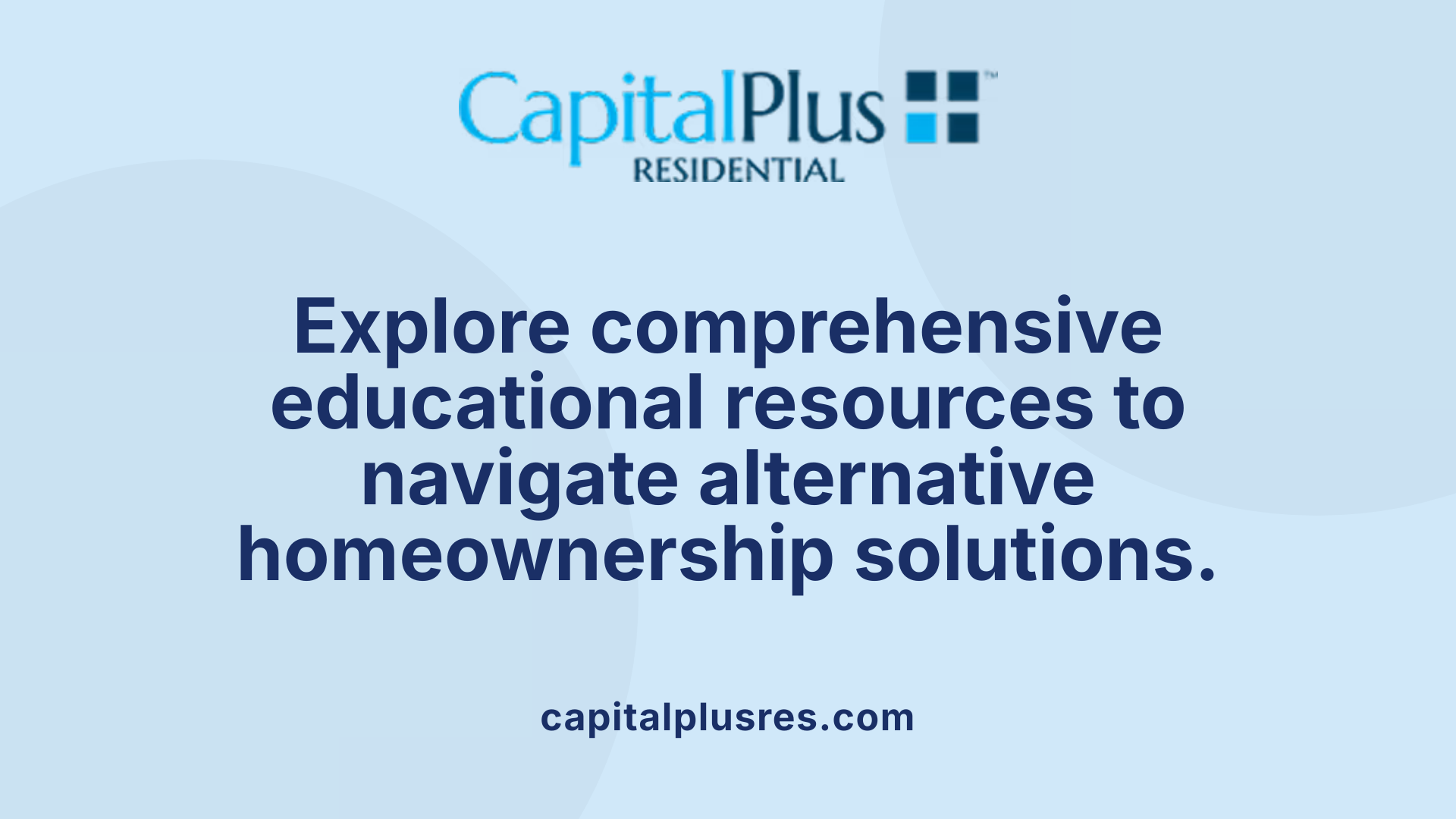 Understanding the various pathways to homeownership, especially through alternatives to traditional financing, can be complex. Fortunately, several educational resources are available to assist prospective buyers in navigating these options.
Understanding the various pathways to homeownership, especially through alternatives to traditional financing, can be complex. Fortunately, several educational resources are available to assist prospective buyers in navigating these options.
Workshops and counseling services play a vital role by offering in-person and virtual sessions. Housing agencies, non-profit organizations like Neighborhood Housing Services Oklahoma, and government bodies such as HUD frequently organize sessions that cover topics such as alternative financing options, credit requirements, and down payment assistance programs. These workshops provide personalized guidance and can help buyers determine the best plan suited to their financial situation.
In addition to live sessions, many organizations offer online courses and comprehensive guides. Platforms like eHome America and Money Fit deliver self-paced, HUD-approved courses—some free and others paid—that educate individuals on the entire homebuying process. These digital resources are valuable for those seeking flexible learning options or who wish to deepen their understanding of specific strategies like seller-financed mortgages or lease-purchase agreements.
Agency resources and online tools further support prospective buyers. Many state and local agencies provide websites with step-by-step checklists, eligibility calculators, and application guides. These tools clarify the requirements for programs like the Great Choice Home Loan, Down Payment Assistance, or special grants for persons with disabilities.
For more tailored assistance, counseling services are available to help individuals understand their options, prepare their applications, and improve their financial readiness. These services often include foreclosure prevention and default management support.
Sources like the Consumer Financial Protection Bureau, Fannie Mae, and real estate associations also publish extensive online guides, FAQs, and calculators that facilitate informed decision-making. Searching terms such as “Homebuying education for alternative financing” can connect prospective buyers with valuable materials tailored to their needs.
Overall, a combination of workshops, online courses, authoritative agency resources, and counseling services provides a comprehensive educational foundation for anyone exploring innovative homeownership solutions.
Homeownership Assistance Programs for Low-to-Moderate Income and Documentation Challenges
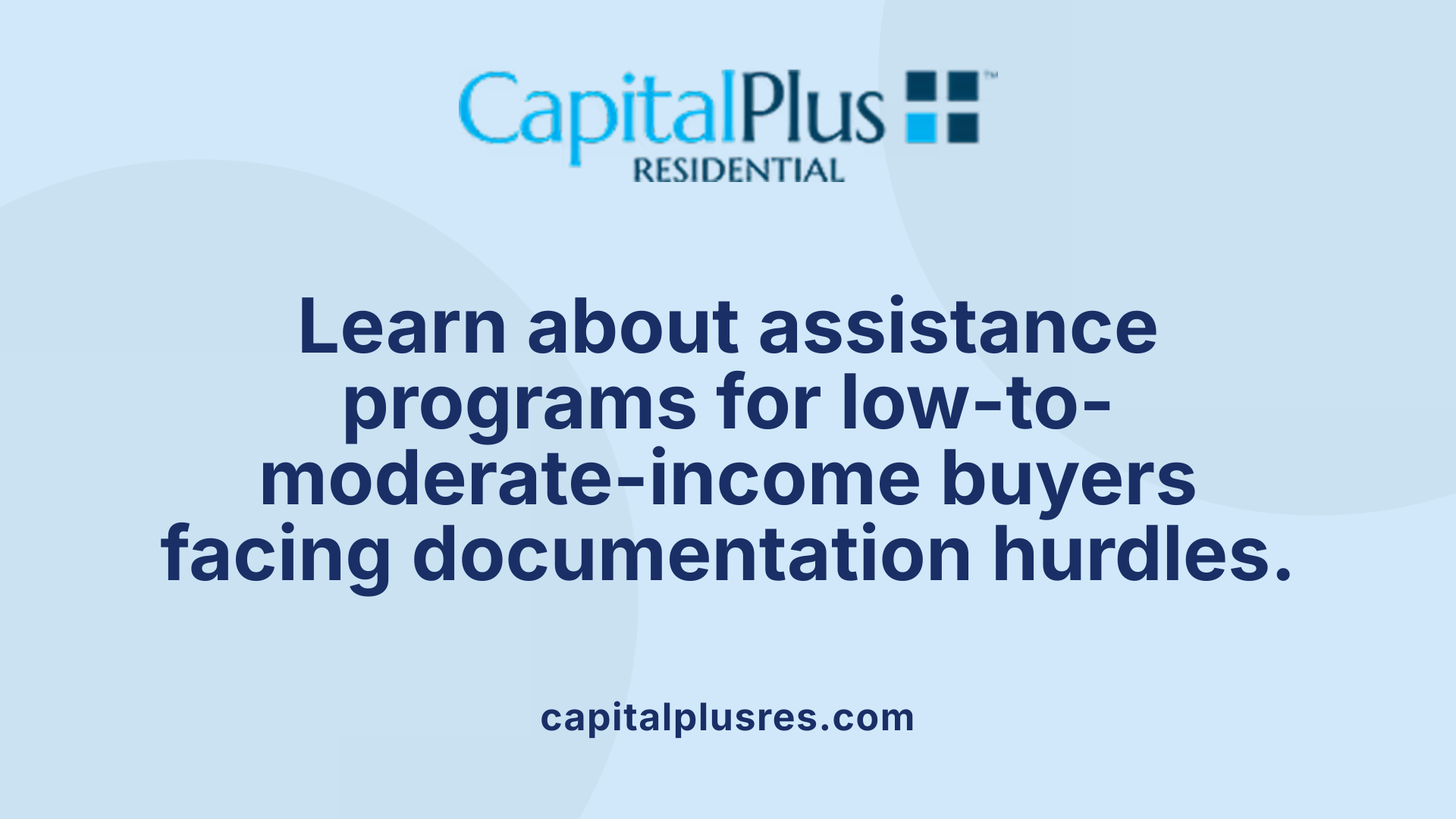
Are there homeownership assistance programs, grants, or support available for low-to-moderate-income buyers or those with documentation challenges?
Yes, numerous programs are designed to support low-to-moderate-income homebuyers and individuals facing challenges with documentation. These initiatives help make homeownership more accessible and affordable.
Several federal, state, and nonprofit programs offer financial assistance and counseling. For instance, programs like the First Step and Step Up provide options with below-market interest rates and help with down payments. The Affordable Income Subsidy Grant can assist in covering closing costs for qualifying applicants, easing the initial financial burdens.
Rural homebuyers benefit from USDA Rural Development loans, which are available in eligible areas. These loans often require no down payment, making rural property ownership more feasible.
Another notable program is NACA (Neighborhood Assistance Corporation of America). NACA offers comprehensive mortgage counseling and provides loans with no down payment or closing costs for low-to-moderate-income individuals, including those with documentation hurdles.
For those using Section 8 housing vouchers, the HOT-PHA program allows recipients to apply their benefits toward purchasing a home, expanding housing options beyond rentals.
Eligibility for these programs generally depends on income levels, residency requirements, and documentation status. Many provide flexible documentation options and support to help verify income and financial readiness.
If you're seeking assistance tailored to low-income or documentation-challenged buyers, exploring these programs can be a vital step toward homeownership. They are designed to reduce barriers and foster inclusive housing opportunities.
Mortgage Alternatives for Self-Employed and 1099 Workers
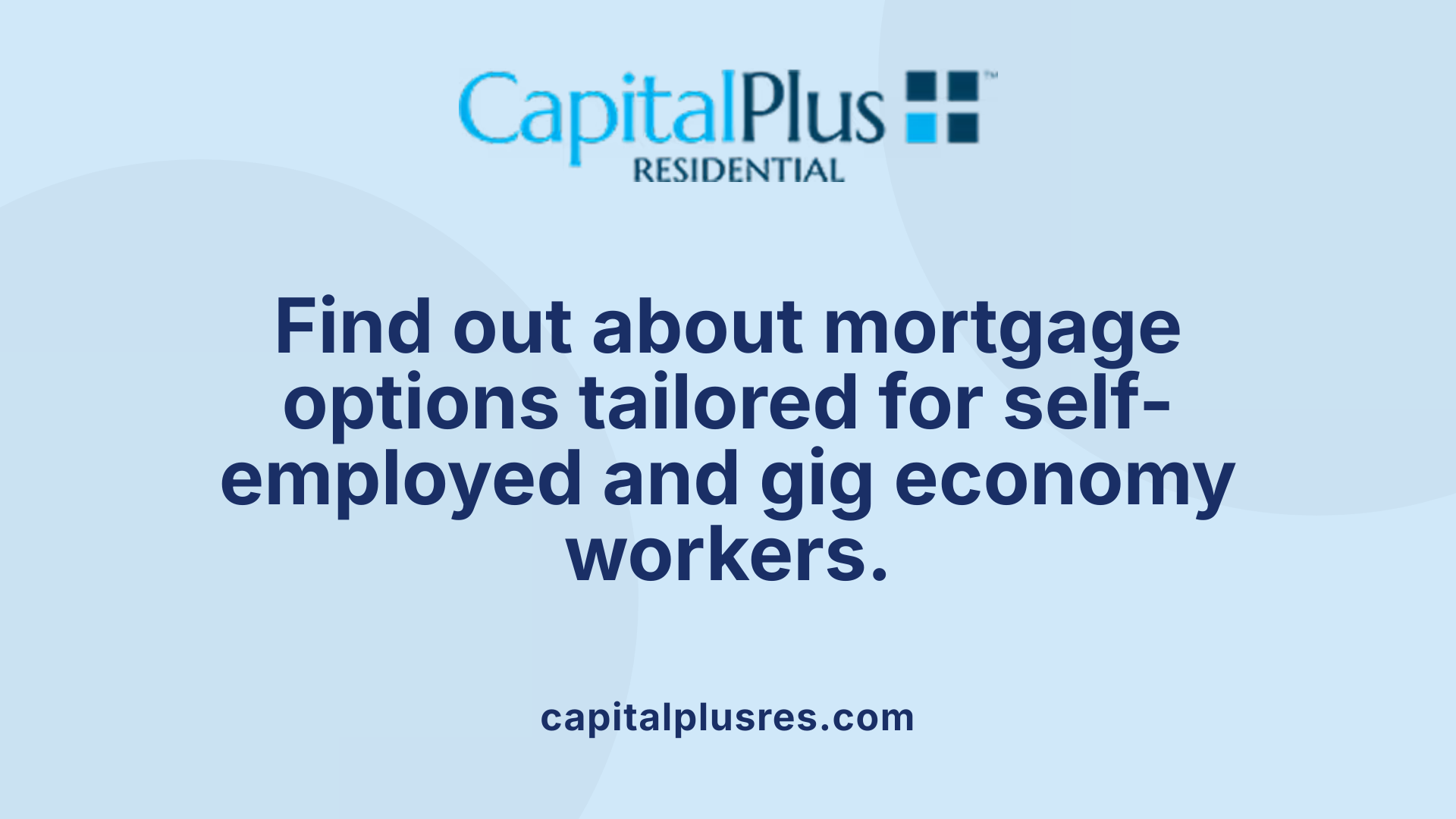 Many self-employed individuals, 1099 workers, and those with unconventional income sources face unique challenges when applying for a mortgage. Traditional loans often rely on extensive documentation such as W-2s and tax returns, which may not accurately reflect their financial situation or may be difficult to produce.
Many self-employed individuals, 1099 workers, and those with unconventional income sources face unique challenges when applying for a mortgage. Traditional loans often rely on extensive documentation such as W-2s and tax returns, which may not accurately reflect their financial situation or may be difficult to produce.
To address this, there are several alternative and non-traditional loan programs designed specifically for these borrowers. One popular option is bank statement loans. These loans evaluate the borrower’s cash flow by analyzing personal or business bank statements over 12 to 24 months, rather than relying solely on tax documents. This method can provide a clearer picture of actual income, especially for those with fluctuating or complex earnings.
Another flexible choice is asset depletion or P&L (Profit & Loss) loans. Asset depletion loans allow borrowers to use their savings, investments, or other assets by applying a percentage of their assets to support the loan application, making it suitable for those with substantial savings but limited traditional income. P&L loans are often used by independent contractors or business owners, where verified profit and loss statements demonstrate ongoing earnings.
For those specifically earning income through 1099 forms, non-QM (non-qualified mortgage) options such as Lite Doc or Profit & Loss loans provide alternatives that minimize income verification requirements. These loans typically accept documentation like 1099 tax forms, bank statements, or profit and loss statements instead of standard W-2s or tax transcripts.
A tailored program for 1099 earners is the 1099 Income Loan, which allows for a quick assessment with minimal documentation, often up to $3 million in financing. These loans tend to accommodate higher debt-to-income ratios and larger down payments, providing flexibility to borrowers with variable or non-traditional income streams.
Overall, these programs expand homeownership opportunities for self-employed and gig economy workers by offering financing solutions that recognize diverse income evidence and financial circumstances.
Alternative Home Financing Methods Beyond Traditional Mortgages
What are alternative home financing options available for buyers with limited or unconventional documentation?
For buyers who face difficulties providing traditional income documentation like tax returns or pay stubs, there are several alternative financing options. These methods can offer access to homeownership, especially for those with non-traditional income sources or limited credit history.
One commonly used approach involves land contracts. In this arrangement, the buyer makes installment payments to the seller over time. However, the seller retains the deed until the final payment is made, which means the buyer often lacks full ownership rights during the contract period. This can pose risks if either party defaults.
Lease-purchase agreements are another option. In this setup, the tenant pays an upfront fee and monthly rent, with the agreement providing the option to buy the property later. Deed transfer usually happens when the purchase is finalized, giving the buyer a potential pathway to ownership while avoiding some traditional lending requirements.
Seller-financed mortgages are arrangements where the seller acts as the lender. This process can expedite the sale and reduce some formalities compared to bank loans. However, it also comes with fewer legal protections for the buyer, and laws regulating these agreements vary by jurisdiction.
For manufactured homes, personal property loans are often used due to issues with titling and property classification. These loans are generally more expensive than traditional mortgages and lack many consumer protections. They are suitable for those needing financing for homes considered personal property rather than real estate.
Historically, the development of these alternative options has been influenced by practices like redlining and racially biased lending. Such practices marginalized specific communities and led to the creation of financing avenues that often carry higher costs and increased risks. These methods lack extensive regulation, contributing to potential vulnerability for buyers.
While these alternatives can facilitate quicker and more flexible transactions, they typically involve higher costs and less oversight. Buyers should carefully consider the terms and potential risks before opting for these options, and consulting with knowledgeable professionals is recommended to ensure fair arrangements.
Empowering Buyers Through Information and Support
Navigating the homebuying process with limited documentation or non-traditional circumstances requires careful consideration of available programs, risks, and protections. While alternative financing methods can provide vital pathways to homeownership, they come with inherent risks that necessitate thorough education, legal understanding, and professional guidance. Recognizing the diverse support systems, from government grants and assistance programs to specialized mortgage options, can significantly empower buyers. Staying informed through reputable resources and advocating for fair, transparent practices will foster a more inclusive housing market where everyone has the opportunity to achieve their homeownership goals.
References
- Great Choice Home Loan
- Mortgage Documentation Alternatives for Self-Employed, ...
- What Has Research Shown About Alternative Home ...
- First-Time Home Buyer Programs, Grants and Loans | 2025
- Down Payment Assistance
- Housing Grants & Loans for People With Disabilities | 2025
- Stated Income Loans: Alternatives and Options for 2025
- No-Doc Mortgages: Are They Still Available?






